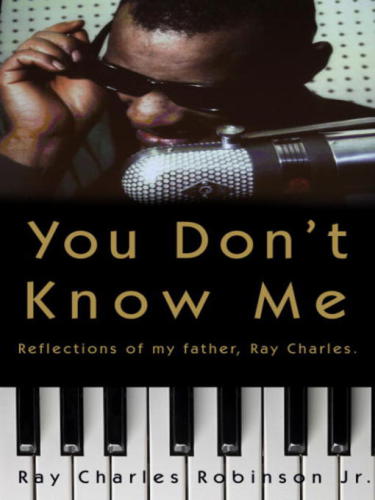
You Don't Know Me
Reflections of My Father, Ray Charles
کتاب های مرتبط
- اطلاعات
- نقد و بررسی
- دیدگاه کاربران
نقد و بررسی

April 12, 2010
From the eldest son, who lived through Charles’s success, adultery, and addictions, comes this candid yet compassionate memoir. At age six, Robinson, now 54, found his father twitching and bloody from shooting heroin. He was nearly 50 before meeting many of his half-siblings from his father’s affairs. In between, his parents successfully created a normal life in Southern California—strict rules, curfew times, a sense of community. Ultimately, Robinson knew his father through his father’s affections, not his fame. He knew a remarkable man with an acute mind who would ride on a Vespa and play chess—a father whose attentions he craved but never thought he had captured. So despite earning a business and economics degree, working with and for his father, and starting a family, Robinson felt rejected. “I had nursed resentment against my father for most of my adult life, “ he writes, “always assuming that someday we would be together and everything would be made right.” Instead, things got worse, and Robinson abused cocaine. Beyond new insider details, this book is a cathartic tale of a son confronting his father’s legacy.

May 15, 2010
Unremarkable memoir of the son of music legend Ray Charles.
Robinson recalls his upbringing and relationship with Charles based on his childhood memories, which are incomplete at best, and his own life story is simply not as compelling as his father's. The most engaging sections of the book concern Robinson's youth. In plain prose, he re-creates a sense of his father's rapid upward trajectory in the 1950s after a life of struggle, and his surreal existence as the inquisitive child of a brilliant black celebrity in a segregated America. As a child, his father was present in his life as a benevolent, fascinating, yet distant figure. Robinson is frank about the darker undercurrents in his father's meticulously arranged existence as family man and famous bandleader. He became aware of his heroin addiction before it culminated in the musician's 1965 arrest, as well as his penchant for extramarital affairs."My father's appetite for women was insatiable," he writes. When the author was 18, in 1973, his mother finally initiated divorce proceedings, which shocked and embittered Charles, who"had convinced himself that the other women shouldn't matter to her as long as she was his wife and he took care of her." Throughout, Robinson's writing is workmanlike and bland, and the narrative becomes tedious as the adult author repeatedly sobers up and relapses into drug use. Even producing the lauded film Ray triggered this cycle—"the film would force me to revisit all the trauma, fear, and anxiety of my childhood."With regard to his father's death in 2004, Robinson flagellates himself for not spending more time with him in his last days, and accuses Charles' handlers of quickly shutting out family members as the music world honored an icon.
For die-hard Ray Charles fans only.
(COPYRIGHT (2010) KIRKUS REVIEWS/NIELSEN BUSINESS MEDIA, INC. ALL RIGHTS RESERVED.)

May 15, 2010
Whether it was a result of the constant touring, their strained father-son relationship, or Ray Charles's controlling business manager, it's obvious in this memoir how absent Charles was from his son's life. To fill his book, Robinson relies heavily on his father's childhood history, extramarital affairs, and drug use, much of which has already been discussed in Charles's autobiography, "Brother Ray". Robinson's portrayals of his interactions with his father, though few and far between, offer a glimpse into their connection and show a man whose sight problems hardly impaired how he lived his life. VERDICT This is not a Ray Charles highlight reel, and discussion about his music is notably absent. Unless you're looking to develop a comprehensive Ray Charles collection, pick up Charles's "Brother Ray" or Michael Lydon's "Ray Charles: Man and Music".Brian Sherman, McNeese State Univ. Lib., Lake Charles, LA
Copyright 2010 Library Journal, LLC Used with permission.

























دیدگاه کاربران